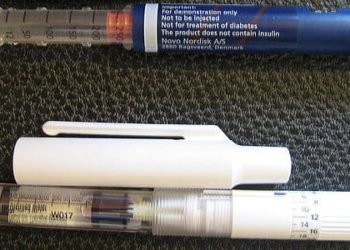Type 1 diabetes unlikely to affect standardized test performance
1. In this Danish retrospective cohort study, there was no association between standardized reading and mathematics test scores and type 1 diabetes.
2. Among those with diabetes, there was an association between test scores and HbA1c levels.
Evidence Rating Level: 2 (Good)
Study Rundown: Type 1 diabetes is associated with microvascular and macrovascular complications. However, the neuroglycopenic and hyperglycemic effects of diabetes have also been suggested to affect cognitive performance. In this Danish retrospective cohort study, children with type 1 diabetes had similar standardized test scores for reading and mathematics, even after adjustment for grade, test topic, year, and socioeconomic status. However, there was a significant association between test scores and HbA1c levels among those with diabetes.
Overall, this study suggested that type 1 diabetes was unlikely to cause significant cognitive dysfunction measurable by standardized testing. This study is limited in its generalizability to other countries that may have weaker medical and social care standards, especially since an association between HbA1c and test scores could signify that poor glycemic control adversely affects cognition. Further research is needed to evaluate the long-term effects of diabetes on cognitive performance and academic ability.
Click to read the study, published today in JAMA
Relevant Reading: Academic abilities and glycaemic control in children and young people with Type 1 diabetes mellitus
In-Depth [retrospective cohort]: 631,620 children (average age 10.31 years, 51% male; n = 2031 with type 1 diabetes) attending grades 2, 3, 4, 6, and 8 in Danish public schools from January 1 2011 to December 31 2015 were studied. Danish students undergo standardized testing for reading in grades 2, 4, 6, and 8, and for math in grades 3 and 6. Included children with diabetes who had at least 1 test score and at least 1 HbA1c measurement before a test were included. The primary outcome was the pooled reading and math test scores. Secondary outcomes such HbA1c, diabetic ketoacidosis, and hypoglycemia as were measured in children with diabetes and correlated with test scores. Mean combined scores in math and reading were 56.11 (SD 24.93) with no differences between children with diabetes (mean 56.56) and children without diabetes (mean 56.11; difference 0.45; CI95 -0.31 to 1.22). Further, no significant differences were found after adjustment for grade, test topic, year, and socioeconomic status (p > 0.05). However, among those with type 1 diabetes, each 1% elevation in HbA1c was associated with a 3.48 point drop in test scores (CI95 -4.32 to -2.64).
Image: PD
©2019 2 Minute Medicine, Inc. All rights reserved. No works may be reproduced without expressed written consent from 2 Minute Medicine, Inc. Inquire about licensing here. No article should be construed as medical advice and is not intended as such by the authors or by 2 Minute Medicine, Inc.







